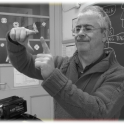We are celebrating the 10-year anniversary of Debats d’Educació by giving the educational community the opportunity to air its views

I am the head teacher of the state school Fructuós Gelabert in Barcelona. I am a member of the Catalan Movements for Pedagogical Renewal Federation (MRP).
The three things I’ve learned
Change takes place in the classroom. But what direction do we give to this change?
Creating the school we need for tomorrow today is possible. And it is possible in the day-to-day practice of our schools, if we are capable of putting an educational idea into practice that will help us to achieve optimum learning, to prepare ourselves to be critical and active citizens, and to have the (cognitive and emotional) resources and tools that will help us to know what we are to do with our lives.
None of this comes from a neutral standpoint, for there is a clear objective: education and school must have a transforming effect, or the most important part of their essence will be lost. This is why a commitment to education and to people is necessary.
Exercise professionalism. Redefine it
Teachers and schools have the capacity to improve their level of professionalism. But we have to believe this is possible and act. We must redefine our day-to-day actions from a perspective of professionalism. The exercise of professionalism implies responsibility, the capacity to take decisions, to act in spite of difficulties, and to be creative in difficult and complex situations. Improving education – tomorrow’s school must be considered from the perspective of this need for improvement – involves exercising this responsibility, without holding up the specific situations in which it is exercised as excuses. Education depends on people: and improving schools implies improving the teachers.
Change the way education is administered
The educational authorities hold an enormous responsibility as the facilitators of change. Thus a radical turn is required when planning this change. The educational authorities must abandon the role of dictating how we are to change, work or teach – someone else can perform this “prescriptive” or “orientative” function much better – and focus 95% of their energy on providing the conditions for facilitating change: among these, ensuring that teaching staff are prepared to improve, take an active involvement in education and exercise their responsibility in this process is of primordial importance.













 The texts published on this website are, unless otherwise indicated, covered by the Creative Commons Spain Attribution 3.0 licence. You may copy, distribute, transmit and adapt the work, provided you attribute it (authorship, journal name, publisher) in the manner specified by the author(s) or licensor(s). The full text of the licence can be consulted here:
The texts published on this website are, unless otherwise indicated, covered by the Creative Commons Spain Attribution 3.0 licence. You may copy, distribute, transmit and adapt the work, provided you attribute it (authorship, journal name, publisher) in the manner specified by the author(s) or licensor(s). The full text of the licence can be consulted here: